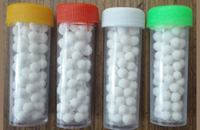What is Homeopathy?

Homeopathy is a system of medical therapy that uses very small doses of medicines, or remedies. These remedies are prepared from substances found in nature. Nevertheless, homeopathy should not be confused with herbal medicine. These two systems of medicine are very different. Herbal medicine uses tinctures of botanical substances, whereas homeopaths use ultra-dilute “micro”doses made from not only plants, but minerals or any other substance found in nature.
The homeopathic doctor chooses the proper remedy by following a special rule of nature called the Law of Similar. This law states “like cures like,” or that a medicine can cure a sick person if it can cause similar sickness in a healthy person. For instance, if you peel an onion, your eyes burn, itch and water. You might also have a runny nose and begin to sneeze. If you had similar symptoms during a cold or allergy attack, such as a runny nose, watery eyes and sneezing, a homeopathic micro-dose of the remedy Allium Cepa (red onion) would help your body heal itself.
The word “homeopathic” is derived from the Greek words homeos meaning “similar” and pathos meaning “disease” or “suffering.” Thus, homeopathy means “to treat with a remedy that produces an effect similar to the disease or suffering.”
Is Homeopathy New?
The Law of Similar has been known since at least the time of Hippocrates (ca. 400 B.C.), but it was Samuel Hahnemann who fully stated the ideas of homeopathy in the early 1800’s. He was a doctor and a chemist in Germany who lived from 1755 to 1843. He discovered the truth of the Law of Similar by testing small doses of medicine on himself.
By 1900, about twenty percent of doctors in the United States were homeopaths, but due to various political and social changes, homeopathy became relatively unknown in the USA until recently. There is wider acceptance of homeopathy in such countries as France, Germany, Mexico, Argentina, India and Great Britain. In fact, the family doctor to England’s Queen Elizabeth is a homeopathic physician.
What are Homeopathic Remedies?
Any plant, mineral or animal substance can be used as a remedy. The original substance is diluted in liquid repeatedly, and vigorously shaken with each dilution. Unusual as it sounds, these very small amounts of remedies can act very strongly when used properly. Also, because the remedies are very diluted, they are extremely safe. The clinical experience of homeopathy shows that the micro-dose is effective: It works upon comatose people, infants and animals.
Is there evidence that homeopathy works?
There are literally hundreds of high quality, published basic science, pre-clinical and clinical studies showing that homeopathy works. These studies have been published in respected journals like Lancet, Pediatrics, Rheumatology, and Annals of Internal Medicine, among others. See this website for an abridged bibliography of these papers.
What to expect during a visit to a homeopathic practitioner?
You will be asked to describe all your problems in detail as well as a complete description of everything that characterizes you, especially your feelings, sensations, sensitivity, psyche, and all that concerns your organism in terms of energy, sleep, appetite, digestion, etc. This thorough and initial interview requires approximately two to three hours. The better the homeopath understands the patient and his or her problems, the better they can individualize to find the specific and most similar remedy for the patient’s condition.
Which diseases can be treated with homeopathy?
This may sound strange but in homeopathy we do not treat diseases, but treat the person who is sick. Whether a person has a chronic or an acute disease, all of their symptoms, whether physical, mental or emotional form a whole representing a state of imbalance very specific to this individual. The goal of the homeopath is to recognize through the unique expression of symptoms of a patient the pattern of disturbed energy and identify among the great number of remedies available the one most homeopathic, or most similar to, the patient’s disease.
